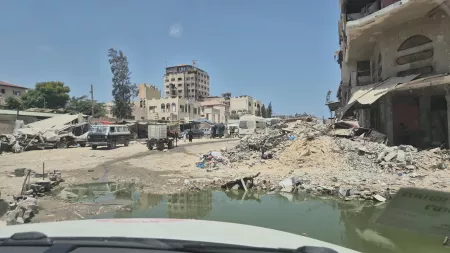Ramallah, Palestine, 30 July – Intensified Israeli airstrikes in areas of Gaza where aid organizations are providing services, including Israeli-designated “humanitarian zones”, have resulted in mass civilian deaths and further shrinking space to deliver life-saving assistance, warn 20 aid agencies today.
Nearly ten months into the escalation of hostilities in Gaza, Israeli authorities continue to issue relocation orders to Palestinians sheltering in areas previously designated as safe. Civilians are not given sufficient time to flee and have nowhere safe to go. Recent intensified aerial bombardment in Gaza’s Middle Area, where civilians previously sheltering in Rafah were told to flee, has been particularly deadly.
“We’ve already seen a spike in skin diseases like scabies, in hepatitis, and gastrointestinal diseases in children. Members of the health cluster, including CARE, are preparing for the worst-case scenario of a polio outbreak in the coming weeks."Francis Hughes, CARE’s Emergency Response Director for Gaza
At the same time, border crossing closures and attacks on aid agencies continue to hamper humanitarian efforts. On 13 July, two NGO staff were killed, and between 21 and 24 July, both UNICEF and UNRWA came under fire: on 21 July, Israeli forces shot at a clearly marked UN convoy attempting to access Gaza City, despite coordination and approval by the Israeli authorities. UNICEF said that, on 23 July, two clearly marked UNICEF convoys were hit by live fire while waiting at a designated holding point in Wadi Gaza as they travelled to reunite five children, including an infant, with their father.
Over 200,000 Palestinians were displaced between 22-27 July after Israeli authorities issued so-called “evacuation orders”. UNRWA has said that some 86% of Gaza has been placed under so-called “evacuation orders” by Israeli military forces, meaning that Israeli authorities expected 2.1 million Palestinians to seek shelter in only 14% of Gaza’s territory, already one of the world’s most densely populated areas prior to nine months of repeated forced displacement.
Women and girls in Gaza are enduring unbearable conditions. With denied access to food, safe water, basic painkillers, and health facilities for safe deliveries, to fuel, the suffering of women who have lost their homes and are experiencing repeated displacement is compounded.
"While there have been no recorded cases so far, we know that doctors could be missing the warning signs given the decimation of the healthcare system and the outbreak of many different communicable diseases.”Francis Hughes, CARE’s Emergency Response Director for Gaza
Repeated attacks on the health system and healthcare workers and continuous relocation orders are causing severe overcrowding and stretching already constrained resources, exponentially increasing the risk of water-borne and infectious disease. On 23 July, the World Health Organization (WHO) reported a high risk of the polio virus spreading across Gaza, after traces were detected in six wastewater samples. WHO said that tens of thousands of children under age five are now at risk of contracting polio, and the possibility of international spread beyond Gaza cannot be ruled out.
Francis Hughes, CARE’s Emergency Response Director for Gaza, said: “We’ve already seen a spike in skin diseases like scabies, in hepatitis, and gastrointestinal diseases in children. Members of the health cluster, including CARE, are preparing for the worst-case scenario of a polio outbreak in the coming weeks. While there have been no recorded cases so far, we know that doctors could be missing the warning signs given the decimation of the healthcare system and the outbreak of many different communicable diseases”.
CARE calls for an immediate ceasefire
CARE continues to call for an immediate and sustained ceasefire in Gaza. Without a ceasefire it is not possible to respond to the scale of the devastation and save lives. We urge all parties to this conflict to abide by their obligations under international humanitarian and human rights law. All parties must refrain from attacking civilians and civilian objects, taking hostages, forcibly deporting and permanently displacing populations, facilitate access of those in need to humanitarian assistance, and ensure the safe and dignified treatment of hostages and people in detention. It is crucial that water and electricity supplies are immediately re-established in Gaza, and sufficient amounts of urgent humanitarian supplies reach all parts of Gaza. The Government of Israel must immediately lift the siege on Gaza.
For any media enquiries, please contact Sulafah Al-Shami, CARE MENA Regional Communications Adviser. Email: [email protected]
